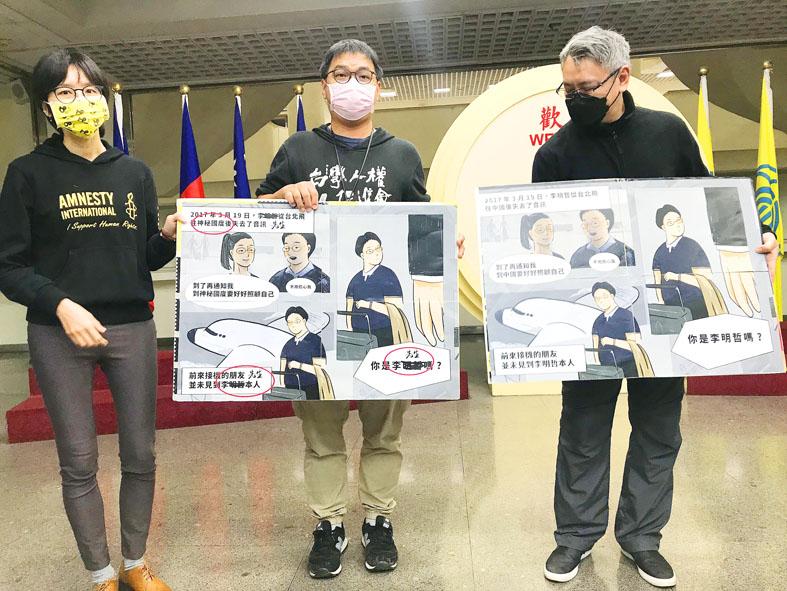Human rights advocates and several Taipei city councilors yesterday accused Taipei Rapid Transit Corp (TRTC, 臺北捷運) of political censorship, after it reportedly rejected an advertisement that mentioned “China” and “Lee Ming-che” (李明哲).
Amnesty International Taiwan had planned to post a comic advertisement on Taipei’s MRT lines on Human Rights Day, Dec. 10, to increase public awareness about Lee, a human rights advocate who has been detained in China since 2017, association secretary-general Chiu E-ling (邱伊翎) said.
However, before it would approve its use, the company asked the association to remove “China” and Lee’s name from the advertisement, she said.

Photo: CNA
The company is a state-run enterprise that receives more than 70 percent of its funding from the Taipei City Government, but it rejected an advertisement by Amnesty International, Taiwan Association for Human Rights secretary-general Shih Yi-hsiang (施逸翔) said.
The advertisement should be protected because Taiwan ratified the International Covenant on Civil and Political Rights, which says: “Everyone shall have the right to freedom of expression; this right shall include freedom to seek, receive and impart information and ideas of all kinds, regardless of frontiers, either orally, in writing or in print, in the form of art or through any other media of his choice,” Shih said.
The company had approved Amnesty International’s “write for rights” advertisement, but not its “write to Lee Ming-che” advertisement, despite the two being similar campaigns, independent Taipei City Councilor Lin Liang-jyun (林亮君) said.
This shows the widespread political censorship that the company exercises over advertisements, which has harmed freedom of expression and the advertising market, she said.
Taipei Mayor Ko Wen-je (柯文哲) frequently says that Taipei is free and democratic, but his actions show the contrary, independent Taipei City Councilor Lin Ying-meng (林穎孟) said, adding that Ko appears to be covering up for China, which is persecuting Lee.
Independent Taipei City Councilor Huang Yu-feng (黃郁芬) said that the company’s advertisement standards are inconsistent.
On the one hand, it rejected the advertisement about Lee due to its politically motivated content, while on the other, it allowed advertisements that hype Ko’s political performance, she said.
The company’s internal advertisement review committee did not detail its reasons for turning down the “write to Lee Ming-che” advertisement, but kept asking Amnesty International Taiwan to revise the content due to a “controversial political issue,” independent Taipei City Councilor Chiu Wei-chieh (邱威傑) said.
TRTC said that the review committee has 13 members, 10 of whom are external members: some professionals — experts on advertising, culture, the arts, architecture, journalism, law, insurance and gender equality — and some from the Consumers’ Foundation.
The company said that it bears the responsibility for not using advertisements that touch on politics, elections or controversial issues that lack a public consensus, as well as those that “offend good morals.”
It said that it had conferred closely with Amnesty International Taiwan on the matter, and it agreed not to use the advertisement after evaluating its potential effects.

INVESTIGATION: The case is the latest instance of a DPP figure being implicated in an espionage network accused of allegedly leaking information to Chinese intelligence Democratic Progressive Party (DPP) member Ho Jen-chieh (何仁傑) was detained and held incommunicado yesterday on suspicion of spying for China during his tenure as assistant to then-minister of foreign affairs Joseph Wu (吳釗燮). The Taipei District Prosecutors’ Office said Ho was implicated during its investigation into alleged spying activities by former Presidential Office consultant Wu Shang-yu (吳尚雨). Prosecutors said there is reason to believe Ho breached the National Security Act (國家安全法) by leaking classified Ministry of Foreign Affairs information to Chinese intelligence. Following interrogation, prosecutors petitioned the Taipei District Court to detain Ho, citing concerns over potential collusion or tampering of evidence. The

‘FORM OF PROTEST’: The German Institute Taipei said it was ‘shocked’ to see Nazi symbolism used in connection with political aims as it condemned the incident Sung Chien-liang (宋建樑), who led efforts to recall Democratic Progressive Party (DPP) Legislator Lee Kun-cheng (李坤城), was released on bail of NT$80,000 yesterday amid an outcry over a Nazi armband he wore to questioning the night before. Sung arrived at the New Taipei City District Prosecutors’ Office for questioning in a recall petition forgery case on Tuesday night wearing a red armband bearing a swastika, carrying a copy of Adolf Hitler’s Mein Kampf and giving a Nazi salute. Sung left the building at 1:15am without the armband and apparently covering the book with a coat. This is a serious international scandal and Chinese

Seventy percent of middle and elementary schools now conduct English classes entirely in English, the Ministry of Education said, as it encourages schools nationwide to adopt this practice Minister of Education (MOE) Cheng Ying-yao (鄭英耀) is scheduled to present a report on the government’s bilingual education policy to the Legislative Yuan’s Education and Culture Committee today. The report would outline strategies aimed at expanding access to education, reducing regional disparities and improving talent cultivation. Implementation of bilingual education policies has varied across local governments, occasionally drawing public criticism. For example, some schools have required teachers of non-English subjects to pass English proficiency

TRADE: The premier pledged safeguards on ‘Made in Taiwan’ labeling, anti-dumping measures and stricter export controls to strengthen its position in trade talks Products labeled “made in Taiwan” must be genuinely made in Taiwan, Premier Cho Jung-tai (卓榮泰) said yesterday, vowing to enforce strict safeguards against “origin laundering” and initiate anti-dumping investigations to prevent China dumping its products in Taiwan. Cho made the remarks in a discussion session with representatives from industries in Kaohsiung. In response to the US government’s recent announcement of “reciprocal” tariffs on its trading partners, President William Lai (賴清德) and Cho last week began a series of consultations with industry leaders nationwide to gather feedback and address concerns. Taiwanese and US officials held a videoconference on Friday evening to discuss the